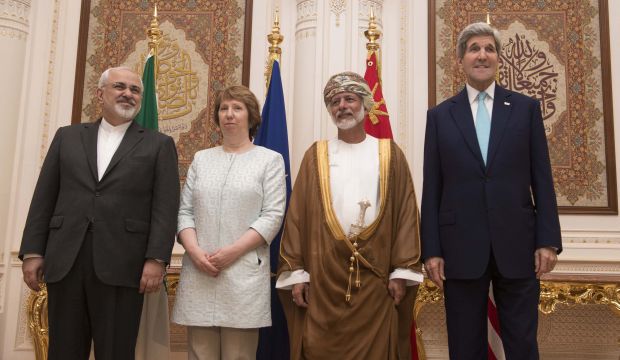Thank God for US Secretary of State John Kerry’s recent moves to “reassure” us in the Arab Gulf states regarding the expected deal between Iran and the P5+1 (the five permanent members of the UN Security Council plus Germany) on Tehran’s controversial nuclear program.
Washington insists any deal with Tehran would not come at the expense of the former’s Gulf allies. But all the leaks from the meetings and negotiations basically reveal how any deal would effectively be rewarding Iran for its sponsoring terrorism over the years—this despite the West’s continual accusations to that effect and Tehran’s blatant interference in the affairs of other states. A quick look at various parts of the Middle East will show you how Iran is currently wreaking havoc across the region, supporting the Houthi coup in Yemen and the Assad war machine in Syria, while its own troops hold territory in parts of Iraq. Not to mention its constant interference into Bahrain’s sovereign affairs and the presence of its dedicated franchise, Hezbollah, in Lebanon.
Any deal would seek to limit Iran’s capacity to produce Uranium to the extent that it would take a year for the Islamic Republic to be able to use the material to produce nuclear weapons. That said, Iran would not be obligated to shut down any of its nuclear infrastructure, and after the deal elapses at the end of its proposed 10–15-year time period Tehran would be able to restart its nuclear program in full, providing it is used for peaceful purposes—as is the case with Japan’s nuclear program. To reward Iran for complying with the deal, the West also proposes to lift current crippling economic sanctions on the country. Any deal essentially benefits only the Islamic Republic, and would come at the expense of everyone else. What a stunning victory that would be for Tehran.
Despite vociferous opposition from the US Congress, President Obama seems desperate to conclude the deal before his final term elapses in 2016. But even if the agreement lasts well into his successor’s term in office, Gulf countries will never be comfortable with it so long as the details remain shrouded in mystery and the deal works so egregiously in Iran’s favor. Frankly, the Iranian regime has every right to be dancing on the rooftops right now. If a deal is signed, the most the US and its allies can do to censure Tehran in the event it does not stick to the agreement or procrastinates on fulfilling various technical requirements regarding its centrifuges, is simply to reinstate the current sanctions: basically returning Iran to its current position; not much of a loss, in other words.
Here we must raise our hats to the Tehran political establishment and give it full marks for its procrastination and delay tactics, which allow it to continue with its nuclear program behind closed doors while paying lip service to the negotiations. Who knows, maybe the world will wake up less than a year from now to find that Tehran has broken the one-year limit on Uranium enrichment and built a nuclear bomb.
A question now raises its head: is there anything the Gulf states can do about this deal?
In light of the West’s keenness to conclude the deal, no one will be assured of Iran’s intentions so long as there are no strong and effective deterrents in place as part of the agreement. The only way this can be done is by stipulating that military force will be used, effective immediately, in the event Iran does not keep up its part of the deal. If Iran is indeed sincere that it is not seeking to militarize its nuclear program then such a proviso need not worry the regime in Tehran. Moreover, this would give the US especially the ability to effectively deter Iran from breaking the terms of the deal, whether after a year, 10 years, or whenever the deal elapses. The world will be able to sleep soundly, safe in the knowledge that it will never wake up to the unpalatable reality of Iran joining the ranks of the world’s nuclear powers. Such a scenario would be catastrophic and would inflame existing tensions in this already turbulent region, plunging it further into chaos and disarray.
I think it would be fair to say that the Gulf Cooperation Council (GCC) committed a grave error when the negotiations first began, by not insisting on being included in the process alongside the P5+1. After all, the GCC states’ geographic proximity to Iran’s nuclear reactors means they stand to lose the most from a nuclear-armed Iran, and they more than anyone else are spooked about Iran’s future role in the Gulf.
I recently spoke to the Omani foreign minister, Yusuf Bin Alawi Bin Abdullah. During our conversation I asked him why the Gulf states have not been participating in the negotiations with Tehran. His reply: “Why should we be involved in the first place? . . . this is not our concern.”
I sincerely hope and pray that this is not the position of the other foreign ministers from the Gulf states.
